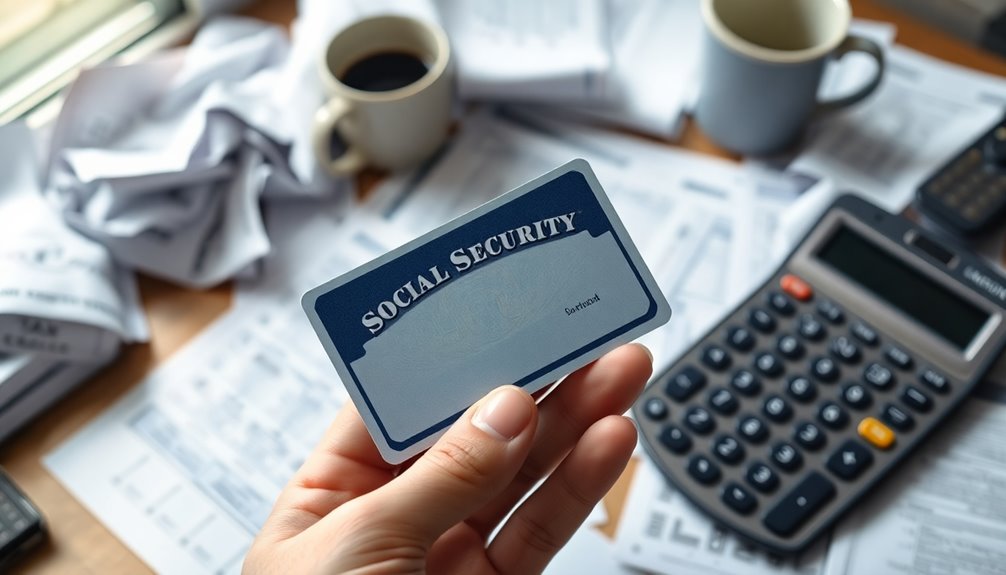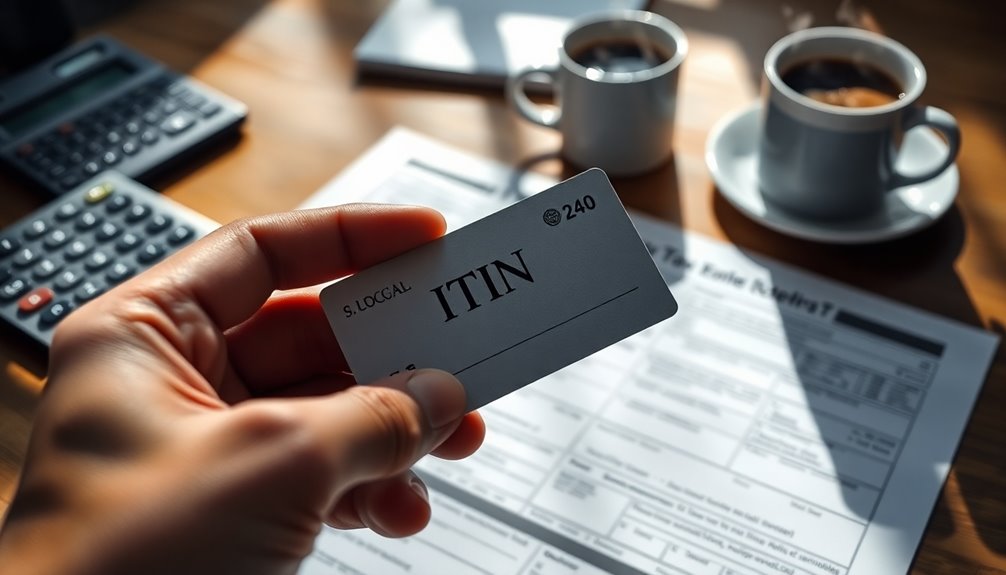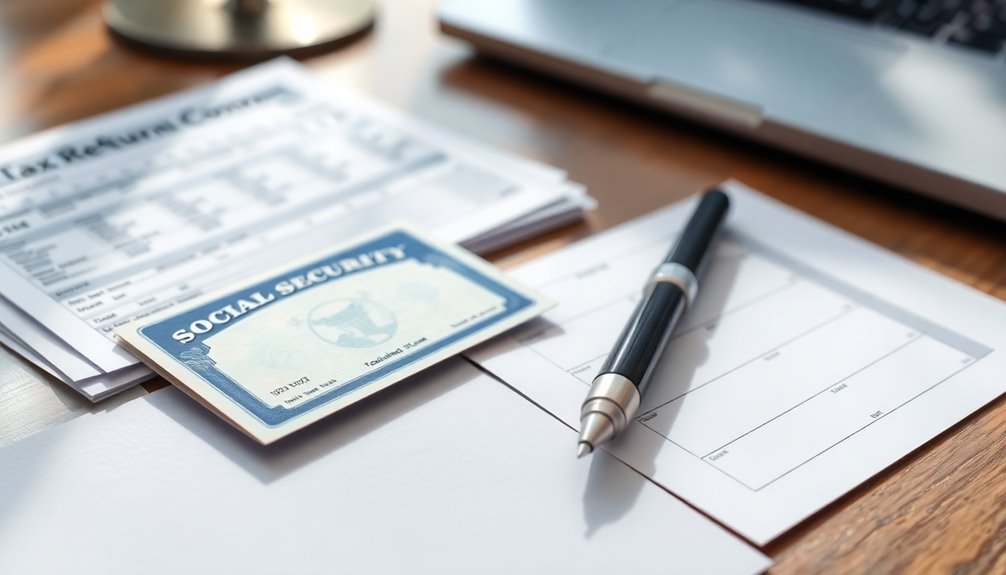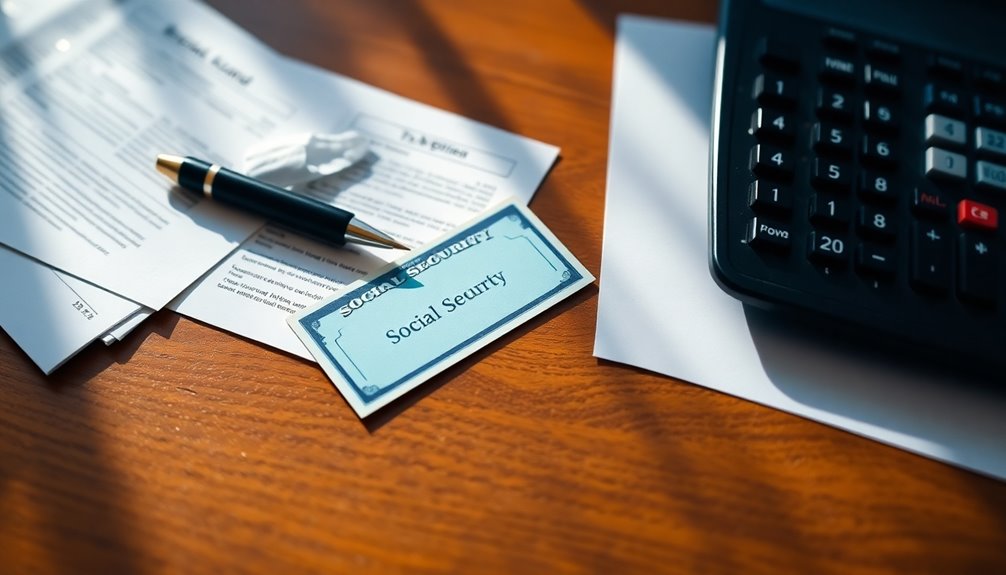You don't need your Social Security card to file your taxes, but you do need your Social Security number. This number is crucial for ensuring your tax return is correctly processed. While having your card can help you verify your SSN, it's not a strict requirement. If you don't have an SSN, you can use an Individual Taxpayer Identification Number (ITIN) for filing. Just make sure all your documents are in order, like proof of income and identification. Curious about what specific documents you'll need? There's more to know to make your filing process smooth and successful.
Key Takeaways
- You don't need your physical Social Security card to file taxes, but you must provide your SSN on tax forms.
- A government-issued photo ID can serve as proof of identity during the tax filing process.
- It's essential to ensure your SSN or ITIN is accurately entered to avoid processing delays in your tax return.
- If you don't have an SSN, you can apply for an ITIN to fulfill tax filing requirements.
- Maintaining organized records of your SSN or ITIN is crucial for compliance and efficient tax filing.
Importance of Social Security Number

In today's world, having a Social Security Number (SSN) is crucial for various aspects of life, from employment to financial transactions. If you're looking for a job in the U.S., you need an SSN. Federal law mandates that every employee must have one to ensure earnings are accurately recorded and to determine eligibility for Social Security benefits.
If you're an international employee, your SSN is often necessary for work authorization.
Your SSN doesn't just play a role in employment; it's also vital for handling financial matters. Banks require it to open accounts and report your interest and investment income to the IRS. If you want to apply for credit cards or loans, your SSN is essential for credit checks.
Moreover, when it comes to government benefits, the SSN is key in determining your eligibility for Social Security, Medicare, and public assistance programs. Additionally, your SSN is essential for tracking your lifetime earnings and benefits, ensuring you receive the correct amount during retirement.
Essentially, your SSN acts as a gateway to multiple aspects of your financial and social well-being, making it indispensable in today's society.
Identifying Required Documents

When preparing to file your taxes, it's essential to gather the right documents, as missing any key items can delay the process.
Start with your identification documents. You'll need a government-issued photo ID, like a driver's license or passport, and proof of taxpayer identification numbers (TIN) for yourself, your spouse, and any dependents. If you don't have your Social Security card, alternative documents such as an SSA letter or Form SSA-1099 can suffice. Keeping documents organized aids in timely filing.
Next, collect your income documents. This includes Forms W-2 for wages and various 1099 forms for other income sources, like interest, dividends, retirement plans, or unemployment insurance.
Don't overlook expense and deduction documents. If you're self-employed, keep records of your business expenses, childcare costs, charitable donations, and healthcare expenses.
Finally, gather additional required documents. These include a copy of last year's tax return for e-filing validation, proof of health insurance coverage, and your banking information for direct deposit of refunds.
Having all these documents ready will streamline your tax filing process and help ensure you don't miss anything important.
Filing Taxes With SSN

Filing taxes requires you to use your Social Security Number (SSN), which serves as your unique taxpayer identification. It's essential for anyone employed in the U.S., including non-citizens authorized to work here.
To obtain an SSN, you must apply in person at your local Social Security Administration (SSA) office using Form SS-5. Be prepared to provide documentation that verifies your immigration status, work eligibility, age, and identity. SSN and ITIN are not national ID numbers, highlighting the importance of keeping your SSN confidential to prevent identity theft.
Once you receive your SSN, you'll need to use it on all tax returns and documents sent to the IRS. Even if your SSN doesn't authorize employment, it's still necessary for tax filing.
Importantly, if you've previously used an Individual Taxpayer Identification Number (ITIN), switch to your SSN once it's issued, as it's the preferred identification for tax purposes.
Alternatives to Social Security Card

Many taxpayers wonder about alternatives to using a Social Security card for filing their taxes. If you're an adoptive parent waiting for a Social Security number, you can apply for an Adoption Taxpayer Identification Number (ATIN).
When filing paper returns, include personal documentation of your Social Security number application and write "Social Security Number Applied FOR" on your return. This ensures you can claim the Adoption Tax Credit on time.
If you've applied for a Social Security number but haven't received it yet, you can include written proof of your application with your paper tax return. Additionally, be aware that if you do not qualify for a Social Security number, you can apply for an Individual Taxpayer Identification Number (ITIN), which serves as an alternative for tax filing.
Make sure to attach a copy of your Social Security application, as the IRS accepts this documentation and will process your refund accordingly.
For those needing an Individual Taxpayer Identification Number (ITIN), consider applying in person at a Certifying Acceptance Agent or an IRS Taxpayer Assistance Center.
This method lets you verify original documents on the spot, avoiding the hassle of mailing them. Remember, specific documentation is required to prove your identity and foreign status, so be prepared with the necessary papers.
Using ITIN for Tax Filing

If you don't have a Social Security number, obtaining an Individual Taxpayer Identification Number (ITIN) can help you navigate your tax responsibilities. ITINs are available to both nonresident and resident aliens, including spouses and dependents of U.S. citizens or resident aliens. Individuals living outside the U.S. may also seek an ITIN.
If you live abroad and have U.S. source income, an ITIN is necessary for filing your tax returns.
To apply for an ITIN, complete IRS Form W-7 and provide identification documents like a passport or driver's license. You'll also need to submit original or certified copies of your foreign status or immigration documents.
If you want to simplify the process, consider working with a Certified Acceptance Agent (CAA) who can help retain your original documents.
While ITINs allow you to file income tax returns, they don't grant access to benefits like Social Security or the Earned Income Tax Credit.
However, you can claim the Other Dependent Credit for dependents with ITINs and may qualify for the Child Tax Credit if your child has a Social Security number.
Using an ITIN can also help you establish residency for tax purposes without sharing information with immigration enforcement agencies.
Common Tax Forms Needed

Gathering the right tax forms can streamline your filing process and help ensure you're accurately reporting your income. First, you need to gather identification and Social Security details. This means having Social Security cards for everyone listed on your tax return, along with another form of ID, like a driver's license or passport.
You'll also need full names, Social Security numbers, and birth dates for yourself, your spouse, and any dependents.
Next, collect your income statements. This includes W-2 forms from each employer, any corrected W-2c forms, and 1099 forms for different income types, such as retirement distributions or freelance work. Remember, Form W-2 is essential for verifying earnings and tax withholdings.
For tax deductions, don't forget forms like the 1098 for mortgage interest, 1098-E for student loan interest, and 1098-T for tuition payments. If you made estimated tax payments, keep copies of Form 1040ES.
Lastly, be sure to include additional forms like Schedule A for itemized deductions and Schedule C for business profits. Gathering all these documents won't only ease your filing process but also ensure you're fully prepared to report your financial situation accurately.
Accuracy in Tax Filing

When it comes to filing your taxes, accuracy is crucial. You must accurately enter your Social Security Number (SSN) or Individual Taxpayer Identification Number (ITIN) on your tax forms. Any mistakes can lead to processing delays or even rejection of your return.
Make sure your SSN or ITIN matches the information on file with the Social Security Administration, including the correct spelling of names. If you don't have an SSN, an ITIN can be used, but it's essential to submit the right forms and documentation. The IRS won't issue an ITIN if you already have an SSN, so check your records carefully. It is important to remember that valid SSN usage is crucial for compliance with tax laws.
Double-check the SSN or ITIN for each individual listed on your return to prevent errors. You should also provide the necessary documentation to support your SSN or ITIN, such as Social Security cards or government-issued IDs. If you're applying for an ITIN, submit original or certified copies of documents proving your identity.
Frequently Asked Questions
Can I File Taxes Without My Social Security Card?
Yes, you can file taxes without your Social Security card. If you have your Social Security number (SSN) memorized or can access it through other documents, you can still proceed with your tax return.
However, if you don't have an SSN, consider applying for an Individual Taxpayer Identification Number (ITIN). This alternative allows you to file your taxes and fulfill your obligations, ensuring you stay compliant with IRS regulations.
What if My Name Doesn't Match My Social Security Card?
If your name doesn't match your Social Security card, you might face issues when e-filing your tax return.
The IRS could reject your return, delay processing, or disallow deductions. To resolve this, notify the Social Security Administration to update your name and provide proof of the change.
Also, inform your employer to ensure your W-2 reflects the correct name. Always use the name on file with the SSA to avoid complications.
How Do I Replace a Lost Social Security Card?
To replace a lost Social Security card, you can apply online through the Social Security Administration (SSA) website, unless you're in Minnesota, Nevada, New Hampshire, Oklahoma, or West Virginia.
If you can't apply online, visit your local Social Security office or mail in your application.
You'll need documents like a birth certificate or passport for citizenship proof, and a driver's license or ID for identity verification.
Expect your replacement card in about 10-14 business days.
Is There a Deadline for Applying for an ITIN?
There isn't a specific deadline for applying for an ITIN, but you should get it before your tax filing deadline to claim certain credits.
If you're a calendar year taxpayer, remember that the extended deadline is October 15.
It's crucial to apply early to avoid complications. Late applications can delay your refund and prevent you from claiming tax credits, so plan ahead to ensure you meet all necessary deadlines.
Can I Use My Spouse's SSN on My Tax Return?
You can't use your spouse's SSN on your tax return without their consent. Each tax return requires accurate SSNs for both spouses, especially if you're filing jointly or married filing separately.
If your spouse doesn't have an SSN, you might need to apply for an ITIN. Failing to include the correct SSN can lead to processing delays, IRS notices, or issues with your state tax return.
Always ensure you're following the proper guidelines.
Conclusion
In conclusion, while you don't need your physical Social Security card to file your taxes, having your Social Security Number handy is essential. It helps identify your records and ensures accurate processing. If you don't have an SSN, you can use an ITIN instead. Just make sure you gather all necessary documents and forms to avoid any issues. Filing your taxes accurately is crucial, so take the time to get everything in order before you submit.









